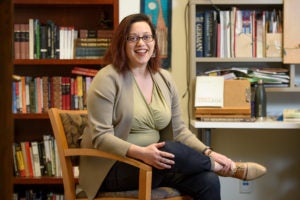SAGE mentorship program to launch in 2018-19
During the 2018-19 academic year, Stanford will launch a new mentorship program for all incoming students that is designed to complement the work of its full-time, professional, academic advisers in the Office of Undergraduate Advising & Research.
Under the new program, known as Stanford Advocates for Growth and Exploration, or SAGE, members of the Stanford community – staff, faculty and other researchers – will mentor students from the time they arrive on campus for New Student Orientation until they declare majors.
Each volunteer mentor – known as a SAGE – will be assigned four to eight students.
The SAGE program will replace the Pre-Major Advising program, an academic advising program – also staffed by volunteers – that has existed at Stanford for decades.
“As Undergraduate Advising and Research has grown, we have expanded our staff of full-time, professional, academic advisers so that we can offer our students substantive advising that is supported by deep curricular expertise and which adheres to best practices,” said Alice Petty, director of pre-major advising.
“This growth has freed us to develop something new. The SAGE program complements our academic advising by prioritizing reflection and self-authorship. The focus is on the whole student and on helping them synthesize their Stanford experiences into a meaningful narrative.”
Members of the Stanford community who volunteer for the program will be matched with incoming students – first-year and transfer students – over the summer before they arrive on campus for New Student Orientation, which introduces new undergraduate students to the wide array of academic, intellectual, leadership, cultural and social experiences available at Stanford.
SAGE volunteers will meet with their groups of students during New Student Orientation, followed by one-on-one meetings in mid- to late October. The volunteer and student will meet at least once per quarter until autumn quarter of the student’s sophomore year, or until the student declares a major, whichever comes first. If students want to continue meeting with their SAGE volunteers through the duration of their sophomore year, they can, but they are no longer required to meet. At Stanford, students are expected to declare a major no later than the end of their sophomore year.
Throughout the academic year, the SAGE and the student will be engaged in an ongoing conversation about the student’s Stanford journey.
Petty said those conversations could cover a wide range of topics, including making the transition to college, weighing options, identifying interests and values, wellness, reflection and meaning-making, struggle, failure and resilience, and the integration of academic and co-curricular experiences into a coherent whole.
“Because the SAGEs get to know each of their students individually, they are ideally situated to connect their students with the high-impact experiences and opportunities at Stanford that are best suited to their individual interests and goals, such as taking part in small group Introductory Seminars taught by esteemed faculty, studying abroad through the Bing Overseas Studies Program, and discovering the value of service through the Haas Center for Public Service,” Petty said.
The SAGE mentors can also share information about campus-wide opportunities to conduct research and independent projects.
Petty said SAGEs can also help connect students with the campus resources that can help them thrive holistically – intellectually, academically, socially, physically and psychologically.

